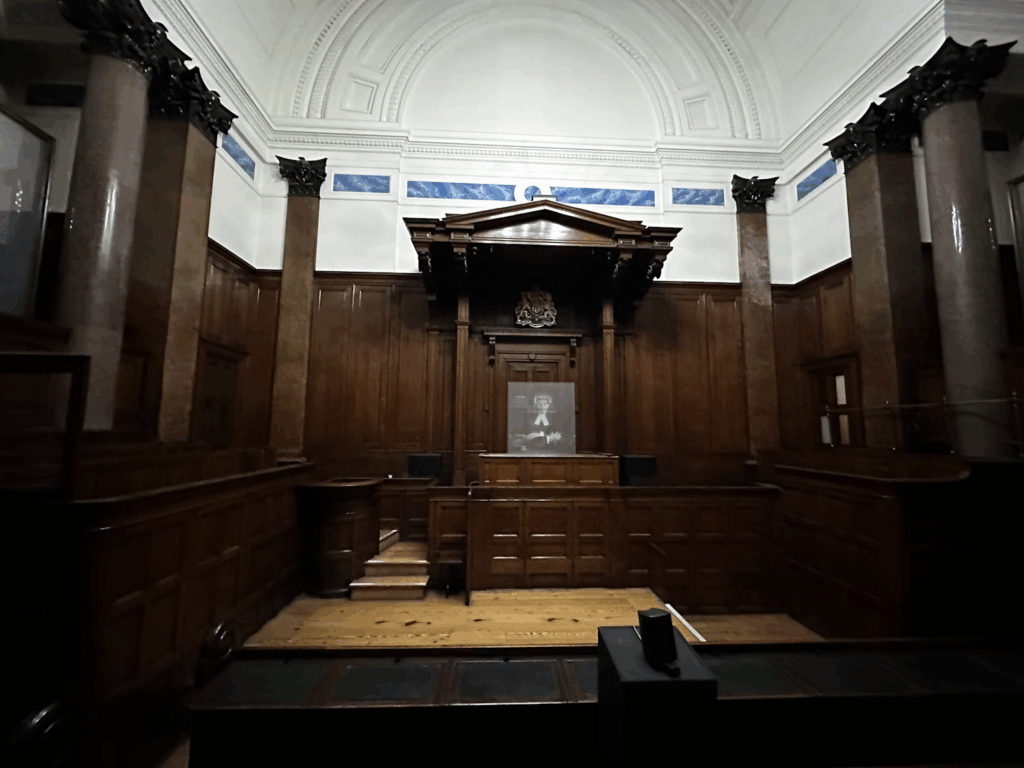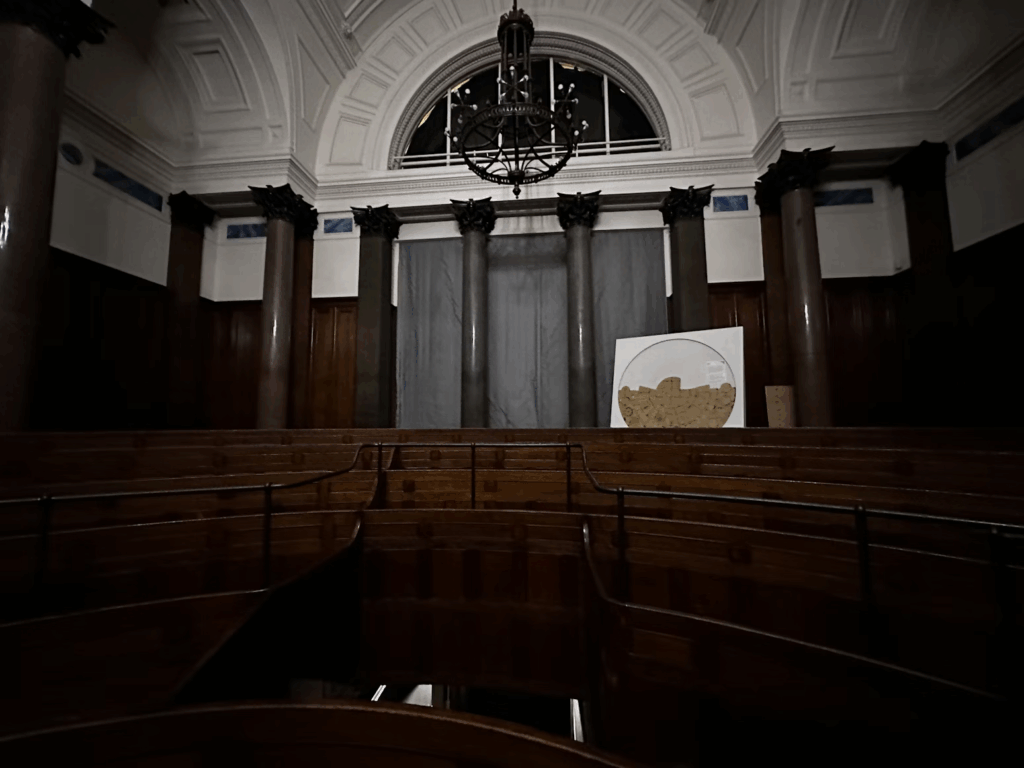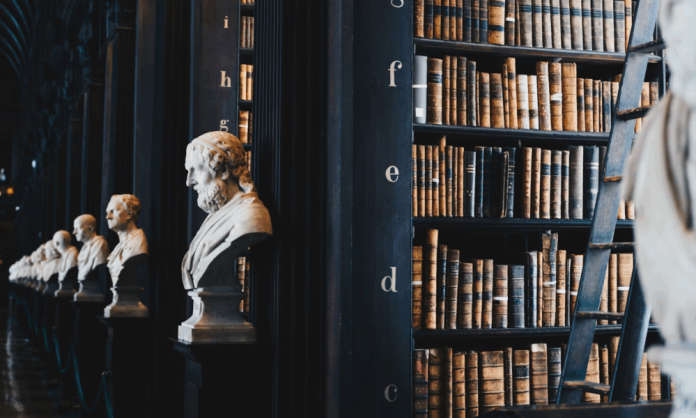The words were thin as the wind slipping through the ironwork, the kind of plea Charles Whitmore had trained himself not to hear. He was late, shoes biting gravel on the approach to his own gates, shoulders tight from a three-hour board session that solved nothing. He reached for the latch, already composing the polite brush-off he gave to strangers and stories he couldn’t fix.
Then came the sound that cut through him—a soft, broken whimper from the bundle in the girl’s arms.
“I don’t carry cash,” he started. “There’s a shelter on—”
He stopped. She couldn’t have been more than twenty, maybe twenty-one. City dust shadowed her face; hunger thinned her cheeks into something older than her years. The bundle shifted, a tiny fist pushing free of torn blankets. A baby, small and pale, trying to cry.
The girl’s dress clung in the cold, her whole body shivering like a drawn wire. She didn’t look away. Brown eyes met his without flinching—the stare of someone on a losing field who still refused to surrender.
That’s when the wind moved her collar, revealing a crescent-shaped birthmark just below her ear.
Charles forgot to breathe. His hand froze on the iron.
He knew that mark.

The past that never stopped knocking
Smell of rain. Voices raised in the foyer. The memory hit with the force of a fall. Twenty-one years earlier in this same house, his father’s face flushed the color of fury while his sister, Margaret, clutched a swaddled bundle and begged. “He won’t have our name, Father. He won’t have anything. But I won’t get rid of him.”
“Then you are no daughter of mine. Get out. GET OUT.”
Margaret’s eyes had found Charles. “Please. Don’t let him.”
He had done nothing—frozen as guards shoved his sister into the storm. Afterward he’d spent millions searching and found only silence. The baby, the doctor had said, had a crescent-shaped birthmark. So did Margaret’s first child.
He stared at the girl at his gate. It couldn’t be. And yet.
“Where did you get that?” His voice sounded like gravel in his own throat. “The mark. On your neck.”
Her fingers rose to it. “This? I was born with it, sir.”
“What’s your name?”
“Elena.”
“And the baby?”
“Sophia. My sister.” She hugged the bundle closer. “I’m sorry for bothering you. I’ll go. She hasn’t eaten since yesterday. I can clean. I can cook. I can do anything.”
Sophia—his mother’s name. Coincidence has limits. Fate sometimes doesn’t.
“Come inside,” he said.
Crossing a threshold neither of them expected
She flinched at the offer. Men with wealth had taught her caution.
“I just need work, or food,” she whispered.
“I’m not asking,” he said, gentler this time, urgency roughening the edges. He unlatched the gates and held them wide. “Your sister is cold.”
She searched his face for the trick and found none, only a man stunned as if he were seeing a ghost. She stepped forward, clutching Sophia, and crossed into a world that felt too warm to be real.
Inside, heat wrapped around her like a heavy coat. Marble floors blazed with chandelier light. The staircase curled into shadow like a ribbon. Her knees went loose. She caught herself on the edge of a Persian rug, eyes sweeping the room like she needed to memorize an exit.

A house that remembers—and a woman who won’t
“Charles? What is taking so long?”
Clarissa Whitmore swept into the foyer in black silk, diamonds leveled at her throat like cold stars. She divided Elena with a single look—torn dress, dirt-marked face, rag-wrapped bundle—and found her verdict.
“What is this?” she asked evenly.
“Get Mrs. Davies,” Charles said. “East guest room. Warm milk. Food.”
“The guest room?” Clarissa’s brow rose. “If you insist on charity, the kitchen can give her a sandwich. At the back door.”
“She is not charity,” Charles said, eyes still on Elena. “And she isn’t using the back door.”
He gestured toward a velvet chair in the sitting room. “Elena, please—sit.”
“I’ll stain it,” she murmured.
“Sit,” he repeated, kneeling, suit creasing in a way expensive tailoring wasn’t meant to. “You said your sister is hungry. Where are your parents?”
“Dead, sir.” Pride steadied her voice. “My mother passed when I was ten. I never knew my father. It’s just been me and Sophia.”
“Your—sister?” Clarissa cut in, disbelief dripping. “You look twenty. That is an infant.”
“My half-sister,” Elena said. “My mother had her before she passed.”
Charles felt the shape of the truth forming like ice in a glass. “What was your mother’s name?”
Elena’s hands tightened until the baby squeaked. “She told me once, when she was very sick, and made me promise to remember. Margaret. Margaret Whitmore.”
Clarissa scoffed. “Impossible. A trick.”
“She didn’t see the name on the gate,” Charles said, voice flat as steel. “She’s been living two blocks from my office for six months—in a shelter I fund.”
“How do you know that?” Clarissa whispered.
“Because I’ve been haunted for twenty-one years.” He turned back to Elena. “Margaret was my sister.”
Elena’s world tilted. The cold, the hunger, the begging—all of it shivered under one stark truth. This man was her uncle.
“I don’t understand,” she said.
“I think you do,” he answered quietly. “Clarissa, call my doctor. Then call my lawyer.”
“A lawyer?” she snapped. “Charles—”
“Get out,” he said.
She stared at him, venom flashing, then turned and left. The silence she left behind had weight.
Proof, not stories
That night, Elena lay sleepless in a bed bigger than any room she’d ever lived in. Sophia, fed and warm, finally slept. Elena tried to believe in soft sheets and safe ceilings and couldn’t. The woman with the diamonds had the look of a person who turned doors into traps.
Charles moved like a man paying down a debt he’d carried too long. He hired investigators to build a wall of fact around Elena. They found the paper trail no one had cared to assemble—hospice records for “Margaret W.,” birth certificates for Elena and for Sophia with “mother: Margaret, father: unknown.” He ordered a DNA test with protocols fit for a courtroom. From a silver hairbrush he had never touched since the night his sister was driven out, they lifted old strands. Under Dr. Nisha Patel’s supervision, a court officer sealed the samples like evidence. When the results came, he didn’t skim the summary. He stared at the percentage until his hands shook. Avuncular match. Ninety-nine-point certainty.
He showed Elena the page and said, “I failed your mother. I won’t fail you.”
Elena tried to let trust in. Clarissa lingered at mirrors and thresholds, silent but sharpened. A tutor arrived—a retired teacher named Naomi Brooks, cardiganed and patient, who taught Elena to balance a checkbook, read a stock ticker, and write an email that could change a room. Staff warmed to Elena because she remembered names and asked about their kids. Sophia’s cheeks rounded and pinked.
At dinner, Clarissa’s comments cut from behind fine manners. “Elena, dear, the napkin belongs in your lap, not as a flag of surrender.” Elena steadied the cloth and said, “Yes, ma’am,” because warmth deserved restraint. Later, Naomi slid a slim paperback across the library table. “Last chapter,” she said. “It’s about what power pretends to be.”

When wealth calls the question out loud
The lawyers met in the study. Harold Garner, the family’s estate attorney, placed a leather folio on the table. “We’ll amend instruments to reflect Ms. Whitmore’s lineage and establish protections for Sophia,” he said. Clarissa, dressed in white, didn’t look at Elena. “Pity isn’t a fiduciary duty,” she murmured. “Neither is cruelty,” Charles replied, signing where Harold pointed.
News traveled like news does. Headlines tugged at the story, talk radio doubted the birthmark, comment sections rehearsed their ignorance. The Foundation board asked for a special session to discuss “continuity” and “stability,” which meant: What happens when a family history they’ve sold as brand gets rewritten in public?
The gala date arrived anyway. The tailor sent two dresses; Elena chose the simpler. Naomi told her she looked beautiful, and Elena’s hands trembled at the zipper. “I’m pretending none of this belongs to me,” she admitted. “Pretend tonight,” Naomi said. “Build the rest.”
She took the staircase. The room quieted. Clarissa’s glass slipped in her hand. Sophia toddled into the light; Elena lifted her. Cameras clicked; legends wrote themselves. After the applause, the quiet was less glamorous—mornings that smelled like coffee and headlines, afternoons with Naomi sketching trust structures on a legal pad, nights at the nursery window whispering, “If you come for us, I’ll be ready.”
A courtroom that weighs more than money
They came.
A courier delivered a petition at 9:13 a.m. Clarissa, through counsel, asked the probate court to block changes to the estate, alleging undue influence, fraud, and a compromised DNA chain of custody. Anonymous letters accused Elena of promising to “split the money” with a man at the shelter, of being unstable. A bus stop photo captioned “UNKNOWN WOMAN” tried to turn a tired face into an argument.
Garner set the packet near the breakfast jam like another fragile jar. “The hearing will be public,” Charles said. “Good,” Elena answered. Naomi squeezed her hand. “Tell the truth about your mother,” she said. “Tell it clean.”
Courtrooms strip you on purpose. Paint is modest, benches are hard, microphones amplify fear. Elena wore navy that felt like a good day in a bad year. The judge had kind eyes and iron posture. Clarissa never touched her throat; Elena noticed and wished she hadn’t.
Dr. Patel testified first, her chain-of-custody recital crisp as a recipe. The “independent” pathologist floated contamination theories; the judge asked one question about refrigerated vaults and wrote something that made Clarissa shift her crossed leg a half inch.
Elena took the stand. “Tell us about your mother,” Garner said. She could have started with the nights, the bleach smell of shelters, the time a teacher said she smelled like a mop bucket, the hymn Margaret hummed when pain made words hard. She started with proof. “She wore this locket,” Elena said, lifting a thin chain. “Hospice cut it when the bruising started. It’s empty. She never found a photo small enough. I keep it because it touched her last heartbeat.”
They asked about the day Margaret said “Whitmore,” about feeding Sophia formula in a men’s room sink because the women’s line was too long. The room stopped rustling. On cross, Clarissa’s attorney built his cathedral out of small gotchas—a date off by three days, the bus stop photo, the volunteer she’d argued with. “Do you usually raise your voice at volunteers?” he asked. “When they forget a box of formula, yes,” she said. He dangled the empty locket like a prize. “It’s empty,” he said. “That’s the point,” she answered. The judge’s mouth almost smiled.
The ruling used “credible” three times. Injunction denied. Trust modifications could proceed under ordinary review. “Thank you, witnesses,” the judge said in a tone that meant go home and stop bleeding on my floor.
Outside, microphones crowded. “No comment,” Garner repeated like a sturdy umbrella. Charles ushered Sophia to the car. Naomi stood between Elena and the cameras and didn’t budge.

When health and vultures arrive at the same time
Back home, the house exhaled—until it didn’t. Two weeks later, Charles collapsed in a board meeting. A clot, a siren, a hallway where fluorescent light made prayers look small. He survived, but the neurologist prescribed rest, therapy, and fewer stressors.
Vultures are punctual. The Foundation board called an emergency session. Owen Price, a jawline in a suit, pitched “continuity” with slides that smoothed theft into compliance. He proposed “rebalancing” endowment funds into program-related investments managed by entities with friendly post office boxes.
Elena sat in back and listened. When they moved to vote, she stood like a student with something worth saying. “I’m not on this board,” she began. “You will be,” said Avery Lang, an old ally with hair like wire. Owen smiled thinly. “This is a fiduciary—” “It’s greed,” Elena said, voice steady. “Your cousin Trevor runs a consultancy with no staff. You paid three ‘impact evaluations’ to a mailbox in Revere that closed in May.”
Owen tried charm. Avery slid a folder down the table—charity registry printouts, FOIA responses, EINs that belonged to no tax returns. The room’s temperature changed. The vote was tabled. An audit ordered. Owen resigned “to pursue opportunities” within forty-eight hours.
Clarissa pivoted to magazine profiles about sacrifice and difficult men. The internet was briefly interested, then bored. She became furniture. It stung.
Charles came home to the east wing; stairs were the enemy. He tolerated the walker and adored the physical therapist who refused to play along. Each afternoon, he and Elena played chess by the window. He taught her the Sicilian Defense like it was a map out of old guilt. She beat him once by accident, once on purpose. He said “proud” with the same caution as “sorry,” and she took both like medicine.
Choosing what the future will mean
The revised Foundation charter passed in summer. Elena insisted on a clause requiring quarterly site visits within a day’s drive. “If we fund it, we should see it. If we can’t see it, we should be honest that we’re trusting a story.” After the vote, Avery told her, “You’ve got your mother’s jaw.” She touched her face and, for the first time, recognized Margaret without needing a mirror.
There were quieter battles. An anonymous call sent a social worker to “check on the infant in a household under transition.” Elena made tea, answered questions, produced feeding schedules down to the ounce. The social worker left with a smile and something like shame. Security traced the call to Clarissa’s assistant. Elena didn’t file a complaint; she added a second nanny so the first could get Sundays off.
One midnight, a letter slid under Elena’s door: If you love the child, meet me at the garden wall. Come alone. She went—love makes poor plans—while head of security Tomas followed anyway. Clarissa stood in a thin coat. “I could make a call,” she said softly. “You’d never see the baby again.” “You could try,” Elena said. “And you’d lose everything your name still protects. The courts would bury you in paper. The papers would finish the job. You’re cruel, not stupid.” Clarissa’s face flickered. “You think you know me,” she said. “I know the rooms you chose,” Elena answered. “They’re lonely. I won’t live in them.”
Clarissa stopped trying to win and settled for haunting. Some afternoons she rode in a car downtown, checked into a hotel under her maiden name, and stood in front of a mirror practicing a smile no one asked for.

The door that stays open
Years turned into rhythm. Elena didn’t redecorate much. She added a kitchen corkboard where staff pinned kids’ drawings, learned three recipes well—chicken soup like Margaret made by guessing, saffron rice Naomi loved because something golden belonged in this house, and a sheet cake she iced with a butter knife. On Sundays, they ate together. On Wednesdays, they read letters from people who had been where Elena had been and were brave enough to say so.
With Charles’s guidance, she used her inheritance to rebuild the city that nearly broke her—shelters for women, scholarships for teens aging out of foster care, school libraries that smelled like paper and futures. A small grant in Margaret’s name gave five thousand dollars and a mentor to anyone who could stand up in a room and say what they wanted to build.
On a night that tasted like winter, Elena stood in front of the gates of a new shelter on the block where she used to beg. The sign read BRIDGE HOUSE in clean lettering that looked like respect. Inside, staff moved with joyful efficiency. A young woman approached, a child’s hand in hers. “Ma’am,” she whispered, eyes on the ground. “I heard maybe you had work.”
Elena swung the gate wide. “We have more than that,” she said. “Come inside.”
At the opening, she spoke briefly. Not about destiny—about weather and doors and how a city holds its breath until someone remembers to exhale. She thanked the quiet workers, Naomi for teaching her the difference between a ledger and a story, Tomas for refusing to let her be brave alone. When she thanked Charles, he stood without his cane and nodded as if to say, This is the measure that matters.
Later, when the lights dimmed to the glow of a place that will outlast speeches, she walked the halls, touched doorframes, peeked into rooms made up for arrivals. In the office, a bulletin board already held three notes: Need to find birth certificate. Looking for job that lets me keep my kid. Does anyone know a good dentist? Elena added a fourth: You can ask twice.
Back at the estate, the gate still carried a name for anyone who cared to read it. Some evenings, Charles sat by the intercom, watching the road like a river. Elena learned to sleep—not perfectly, but enough that mornings felt like gifts again. She kept Margaret’s empty locket at her throat, a little vessel for everything words can’t carry, and told a photograph, “We’re okay.”
One day, Sophia stood at the top of the staircase before the second gala and announced she would sing a song. She sang off-key and gloriously. Elena clapped hard enough to steady the building. In the shadows, Clarissa closed her eyes—not moved, exactly, but remembering, briefly, what it felt like to be applauded for no reason.
There are tidy endings and there are rooms you keep walking through. In the study, Charles and Elena moved pawns across a board and saved each other with ordinary choices. Outside, a bus sighed to a stop; people stepped into night shifts and leftovers and lives legends skip. Across town, a volunteer at Bridge House heard a familiar sentence—“I can do anything”—and answered the way Elena had taught her.
“We have more than that,” she said. “Come inside.”
Please let us know your thoughts and SHARE this story with your Friends and Family!

